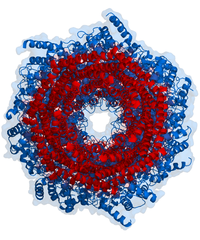
Photo from wikipedia
The proteasome complex is mainly responsible for proteolytic degradation of cytosolic proteins, generating the C-terminus of MHC I-restricted peptide ligands and CD8 T cell epitopes. Therefore, prediction of proteasomal cleavage… Click to show full abstract
The proteasome complex is mainly responsible for proteolytic degradation of cytosolic proteins, generating the C-terminus of MHC I-restricted peptide ligands and CD8 T cell epitopes. Therefore, prediction of proteasomal cleavage sites is relevant for anticipating CD8 T-cell epitopes. There are two different proteasomes, the constitutive proteasome, expressed in all types of cells, and the immunoproteasome, constitutively expressed in dendritic cells. Although both proteasome forms generate peptides for presentation by MHC I molecules, the immunoproteasome is the main form involved in providing peptide fragments for priming CD8 T cells. On the contrary, the proteasome provides peptides for presentation by MHC I molecules that can be targeted by already primed CD8 T cells. Proteasome cleavage prediction server (PCPS) is a server for predicting cleavage sites generated by both the constitutive proteasome and the immunoproteasome. Here, we illustrate the usage of PCPS to predict proteasome and immunoproteasome cleavage sites and compare the results with those provided by NetChop, a related tool available online. PCPS is implemented for free public use available online at http://imed.med.ucm.es/Tools/pcps/ .
Journal Title: Methods in molecular biology
Year Published: 2020
Link to full text (if available)
Share on Social Media: Sign Up to like & get
recommendations!